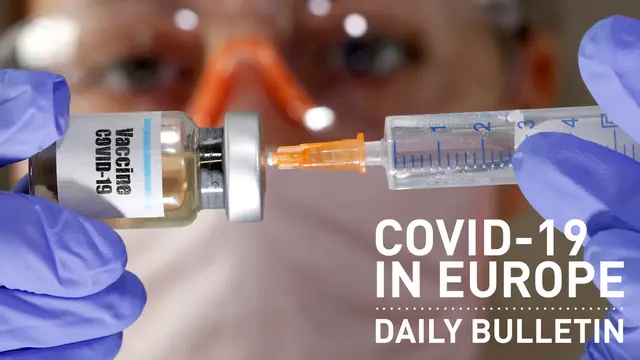TOP HEADLINES
-
The German government has announced it will pump a further $11.8bn into the country's economy. Within the package is the extension of a scheme that tops up pay for workers who have had their hours reduced during the pandemic.
-
France has provided a $2.3 billion aid package for the arts and culture sectors, which have both been badly affected during COVID-19.
The French city of Marseille makes face masks mandatory across the city. All bars and restaurants in the Bouches-de-Rhone region, which includes Marseille, must close at 11 pm and not reopen again until 6 am.
-
Spain's Prime Minister Pedro Sanchez has announced that 2,000 members of the army will be deployed to help regionalgovernments who are struggling to keep up with contact tracing after 81,000 new cases were confirmed in the last two weeks.
-
Ireland's Prime Minister Micheal Martin and deputy Prime Minister Leo Varadkar have both stated there were clear breaches of public health guidelines during European trade commissioner Phil Hogan's trip to Ireland.
-
The UK government has announced children will have to wear face masks in schools, just days before teachers and pupils are set to return.
-
Therapeutics company Translate Bio **said the experimental COVID-19 vaccine it developed alongside French drugmaker Sanofi induced an immune response **in the early stages of non-human studies. The vaccine will now be tested on humans, starting in November.
-
Sweden's public health agency said a faulty test kit had returned around 3,700 false-positive results.
-
Hungary's schools can reopen from next week for the first time since March, according to the minister of human capacities, Miklos Kasler.

Spain's Prime Minister Pedro Sanchez has deployed 2,000 members of the army to help the country fight the rising infection rate. /Reuters
Our children must be able to return to school in a safe environment.
- Sadiq Khan, Mayor of London
ACROSS EUROPE
Ross Cullen in Paris
From Wednesday, France's second-biggest city, Marseille, is making face masks mandatory across the city, including all outdoor areas.
Additionally, all bars and restaurants in Bouches-de-Rhone, the southern region that includes Marseille, must close between 11 pm and 6 am.
The local authorities say they have made a move to confront the growing incidence rate of contracting the coronavirus, which currently stands at 191 per 100,000 people in the region.The French national rate is 33 per 100,000 people.
The prime minister says that face masks will not be provided free of charge to pupils ahead of the start of the new school year on 1 September.
Jean Castex says the government has provided 50 million masks so far to vulnerable families. He also confirmed that the government's $118 billion recovery package for the French economy would be officially unveiled on 3 September.
Incase you missed it:
·
Scientists track concert-goers in Germany to study how COVID-19 spreads
·
'I would just shout and scream at nothing': Depression during COVID-19
Iolo ap Dafydd and Andrew Wilson in London
Secondary school children in local lockdown regions of England will have to wear masks in corridors and communal areas where there's a high infection rate of coronavirus. It's a change in the UK government's previous stance, but Education Secretary Gavin Williamson says he is following advice from the World Health Organization (WHO).
Headteachers in schools will have "flexibility" on introducing masks in the classroom but in communal areas, it will be compulsory for pupils in Year 7 and above.
Why the change? It follows the WHO's advice that children older than 12 should wear face masks, just like adults. Scotland and Northern Ireland's decision to introduce masks also added pressure for England to follow. The Welsh government is reviewing its policy.
The Headteachers' Union warned of confusion and a lack of clarity. However, someConservative MPs have criticized their own government for another U-turn, saying it suggests schools are unsafe.
Despite the prime minister's appeals to people to go back to work, the majority of government officials are expected to continue working from home until at least the end of the year. In a poll of Britain's biggest firms, none plan to force staff back to work any time soon.
FROM OUR GLOBAL COLLEAGUES
CGTN Europe podcast:
Notes on a pandemic: New hope for the planet
**CGTN China: **
Yan Bingyan: Pandemic inspires us to rationally develop film industry
CGTN America:
Young people fueling recent spike of COVID-19 cases as classes resume
CGTN Africa:
Chinese firm donates anti-malaria drugs to Kenya
Sign up
here
to get the COVID-19 Europe bulletin sent directly to your inbox
CGTN Europe has been providing in-depth coverage of the novel coronavirus story as it has unfolded.
Here
you can read the essential information about the crisis.
 简体中文
简体中文











